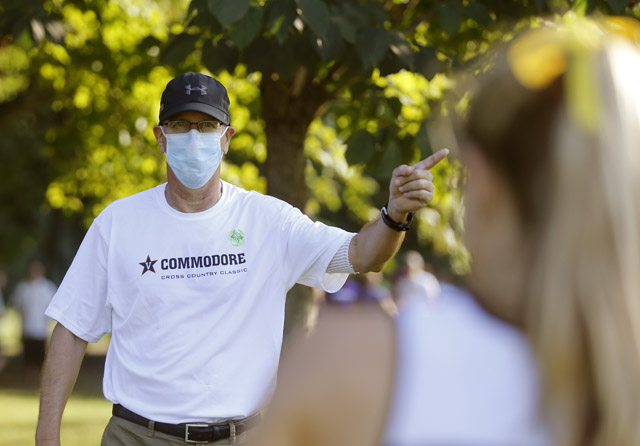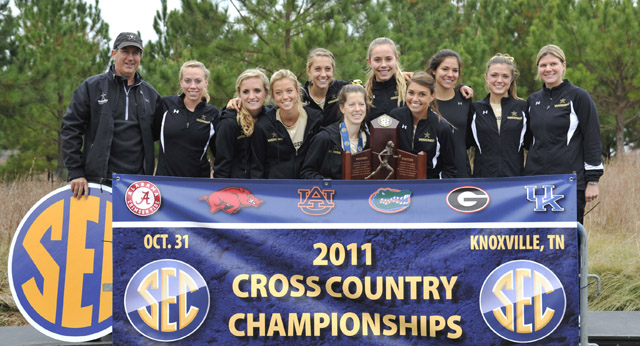Dec. 23, 2013
By Jerome Boettcher I Subscribe to Commodore Nation

A new beard and long, flowing white curls have been added.
But the red suit with the white trim and brass belt buckle haven’t wavered. Sure, the fabrics are wrinkled and the hue has faded a little.
Still, Vanderbilt cross country and track coach Steve Keith waxes nostalgic when he rings those bells and wears that suit. It is the same ensemble his grandfather donned on those Christmas mornings some 40-plus years ago  much to the delight of Keith and his older sister, Katherine, and older brother, Robert.
“When I’m ringing those bells at 6:30 in the morning right before sunrise, it’s a big flashback for me,” Keith says with a smile. Keith took the baton from his grandfather when Katherine had kids. Early on Christmas day outside his sister’s house in Alexandria, Va., he went clanging those bells, waking up his nieces. To the window they’d run and rub their eyes, not believing what was in front of themâ€â€Santa Claus trudging through the snow on their deck waving to them.
“We did it so well that we probably extended their belief in Santa for a year or two longer maybe than socially they should have,” Keith said. “The whole key is you do it right before sunrise so that it is dark. Then you get out of the way. Then five, 10 minutes later it is light outside and they don’t realize… ‘Did that really happen?'”
The suit has gone unused for a while. But this Christmas, Katherine’s first granddaughter Lily will be three months old. Too young for Lily to know what is going on.
But Keith will be in Alexandria  his first trip in months  back in that Santa suit; even if he thinks Lily won’t get much out of it.
“We’ll get a lot of it,” Katherine said laughing.
And cancer won’t keep Keith from being the uncleâ€â€now great uncleâ€â€who dresses up.
In March, Keith was diagnosed with myelodysplastic syndrome (MDS). The cancer prevents the bone marrow from producing enough healthy blood cells. Abnormal cells also form in the blood or bone marrow.
The 54-year-old had to be rushed via LifeFlight to Vanderbilt University Medical Center when he developed severe symptoms at the SEC Indoor Track Championships in Fayetteville, Ark., in February.
“He was very ill right from the start,” Dr. Sanjay Mohan said. “The symptoms had been present maybe a few weeks and had been fairly progressive to get him to that point where he needed acute hospitalization. Early on there were a lot of concerns for infection due to a compromised immune system, which, from what we eventually found out, was the myelodysplastic syndrome.”
Keith spent the next two weeks at VU Medical Center while Mohan and Dr. Madan Jagasia tried to stabilize his condition until they could make a diagnosis. To improve his condition in order to receive a bone marrow transplant, Keith began receiving a medication called Azacitidine through an IV for seven straight days once a month. The hope is the drug will control the myelodysplasia so healthier blood cells form, blood counts rise and the symptoms dissipate.
“The donor search can take time, and we didn’t have time,” Mohan said.
After a few months, however, and several bone marrow biopsies the Azacitidine wasn’t creating the response the doctors had hoped for. So in July they opted to start Keith on two intense rounds of chemotherapy; both lasted a week followed by four weeks of recovery. The treatment did the trick, sending Keith into complete remission before finding a donor and receiving a bone marrow transplant in September.
“From very early on, I think Coach has been very pragmatic,” Mohan said. “But also, even as we were trying to actually secure the diagnosis, he has always looked forward. That is my impression of him. He is always thinking ahead as far as what he can to do to participate, to contribute, to take ownership of his own medical care. “He has taken it on as a project to make sure he is doing everything he can in his power to make sure that he does well.”
Not surprisingly to his peers, his student-athletes, friends and family, Keith has attacked MDS head-on.
Maintaining his positive attitude, Keith homed in on things he could control. He focuses on improving his fitness, which he believes helped his body in preparation for the chemo and transplant. The day after he received the transplant, he spent 20 minutes on the stationary bike and rode for another 30 minutes later that afternoon.
“He is amazing,” said Katherine, a breast cancer survivor. “I actually had to start running and biking because I felt like such a slug because here is my brother who had a stem cell transplant and he is already out there walking four or five miles a day. It is hard to justify not doing it when he is out there doing it.”
Not long after receiving the transplant, he was back at morning practices, which begin at 6:45. Junior Claire Benjamin was in awe when she saw Keith walking the 5.8-mile loop at Percy Warner Park while the team ran the course.
“Ever since March he has been incredible in overcoming this,” said assistant coach Rhonda Riley, who is in her seventh year working with Keith. “You wouldn’t even know he had cancer. He has been positive since day one, and I think that has helped him get better. That positivity and still staying connected with the team as much as he could is what gave him hope.”
The 1981 graduate of Vanderbilt took over the cross country program in 2006. He has spent the past two seasons heading up the track and field programs. In 2011, the women’s cross country team won its first SEC championship in program history. A few weeks later, they placed sixth at the national meet.

Mohan noted how Keith boasted about his team’s progression. His doctor also came away impressed when Keith pulled out his tablet and began organizing practice schedules while sitting in the infusion center in the hospital.
Riley has led the team in Keith’s absence. He constantly communicates with Riley to keep tabs on runners and their times. In September, when Riley was with team at a meet in Minnesota, Keith texted her from Nashville at 6 a.m. the day of the meet to notify her of the weather in Minnesota.
“The guy is crazy,” Riley says smiling. “He really pours everything into this program, into the girls, into seeing it succeed.”
Keith still isn’t allowed to travel to meets. His time away from the team, especially last spring in the early stages of treatment, was an adjustment for everybody.
“It has been tough,” Keith said. “You get to know the kids the most when you travel with them and you go through the hard training with them. Then ultimately you get the reward of competing with them, and that’s hard to replace. You can’t replace that. But the structure we have set up with Rhonda and (volunteer assistant coach) Sonja (Friend-Uhl) helping also and with (assistant coaches) Clark (Humphreys) and Donnie (Young) handling the track side, we’re in as a good of a position as possible for me to take some steps back. That’s obviously necessary.”
Riley says this year’s squad had the closest team chemistry she has seen in her seven years. She credits some of that to the veteran leadership embracing the situation and stepping up.
Keith can be contained only so much. His thick hair fell out from the chemotherapy, but, as he recently proudly pointed out, there were patches “still fighting to hang on too.” Keith, wearing a mask, stopped by the team’s season-opening cross country meet in August at Percy Warner Park to offer words of encouragement. Throughout the season, the team wore red and white bowsâ€â€the colors of awareness for MDS.
“Coach Keith is incredible and definitely an inspiration to us on a daily basis,” Benjamin said. “He is so determined to live his life normally and be there for us.”
Though he continues to check in at the hospital almost daily, Keith has started to show up in the office every day, even if for just a couple hours. His parents, sister and brother have all traveled into town at different times to help serve as caregivers. In the 100 days following his transplant, Keith is being monitored closely. After the infusion, there is a risk of infection or a complication called graft versus host disease, in which his body adjusts to the new stem cells.
In early November, his blood cell counts were up  a positive sign in the recovery process. Bone marrow biopsies will be performed to make sure his blood levels are up. If he is in remission, his visits to the hospital will happen less frequently and his medications will be altered. By January, Riley expects her boss to be back to his old self.
“It is a long, long process,” Keith said. “But the things I can control are my mental health, stay positive, stay as involved as I can with keeping enough normalcy in my life. Then my activity level and fitness has been essential to making me feel better through it all. I think it has had a big effect in how I’ve been able to handle the different types of therapy they’ve had.
“I don’t think you have enough time to worry about something that has already happened. You need to make it better.”


